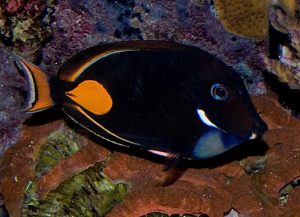Fortunately, people all over planet Earth are becoming increasing aware of the damage that we, as the dominant species, are doing to this planet. Whether we still have time to detoxify what we have made toxic with mindless industrial growth, and to stop global warming before it’s too late is a matter of debate. There are some scientists who suspect that we are already past the tipping point. Hopefully, they are wrong. However, I’m not in this editorial going to offer my opinion regarding those responsible for the dilemma that we as a global community are in. I’m interested here in the role we play as aquarists.
We often hear from critics that if we really cared about the environment, specifically the planet’s coral reefs, we would not remove into captivity any of its creatures. I don’t agree – so long as we do so without damage to the habitat and in a sustainable way we are not damaging the environment. Furthermore, it is aquarists and marine biologists who know and care the most about these creatures. It is we who understand the most about the biochemistry necessary for their survival, and what temperature, UV, and eutropication can do to these beautiful sea creatures. In other words, we know what uncontrolled temperature, pollution, etc can do to a closed system reef tank. In many ways our reef tanks are microcosms of the macrocosm called Earth. Reef keepers recognize how complex the biochemical nature of life on planet Earth is from our struggles to establish and maintain a successful biotope, our reef tanks. In fact, it may ultimately turn out that much of the natural world that
we admire will only survive in captivity, and that without our captive specimens their DNA will be lost to future generations, who hopefully will be wiser in maintaining Earth’s wild life.
The last point that I want to make has to do with our use of technology with its impact on the global environment, our ability to separate scientific fact from opinion, and how to care for the animals we take into captivity. In this regard, we have come a long way, but still can do much more. Let me be specific.
Keeping a reef tank is very energy demanding. Therefore, we need to use energy as efficiently as possible. Lighting is probably the most energy demanding, and as a result I had high hopes for the new LED fixtures, and still do. However, from what I have read on the boards it appears that there are still cost and production problems to be worked out.
Some of the new high efficiency circulations pumps are a great improvement. By switching away from an 11-amp. Jacuzzi pump to a 3-amp. Sequence Hammerhead pump I saved almost $50.00 monthly and lowered my impact on the environment significantly. Shortening the photo period as much as possible without harming our photosynthetic organisms is a plus for our wallets and the environment. As many already do, swapping coral frags decreases what we take from nature and decreases the energy it takes to ship wild animals. Buying only or mostly tank raised fish is also a plus for similar reasons. By now I think you get the point: we need to protect the planet by using energy and nature wisely. Planet Earth is not inexhaustible.











0 Comments